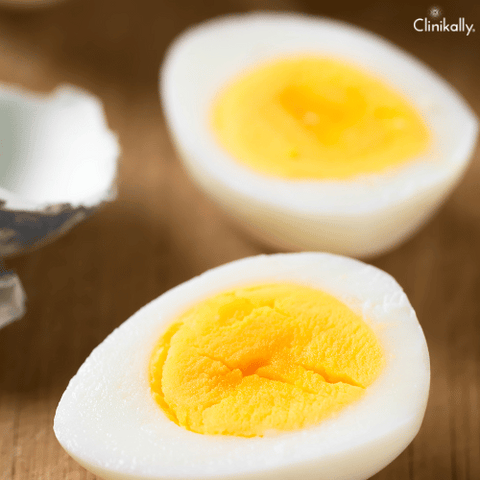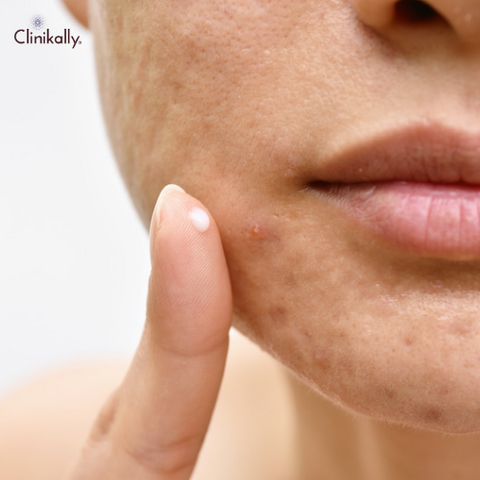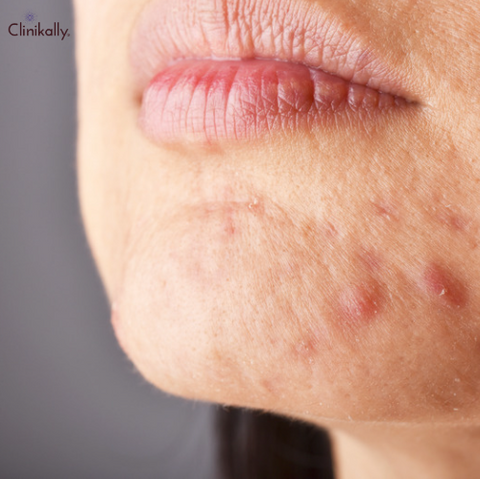Acne can be a stubborn skin condition, often fuelled by a complex interplay of genetic, hormonal, and environmental factors. Among these, dietary influences have become a hot topic of research and debate, specifically focusing on common foods like eggs. This article unravels the connection between eggs and acne, explores other dietary triggers, and offers insights into how personalized nutrition can contribute to effective acne management.
Unraveling the Link between Eggs and Acne

Acne, a common skin condition that affects millions of individuals worldwide, has long been a topic of extensive research and speculation. In recent years, a particular focus has emerged surrounding the potential connection between egg consumption and acne development. As eggs have remained a staple in the human diet for centuries, understanding the role they play in skin health has become increasingly crucial. This article delves into the intricate relationship between eggs and acne, aiming to unravel the scientific evidence and shed light on whether these protein-rich orbs truly have an impact on acne formation. By exploring the latest findings and perspectives from dermatologists and researchers, we aim to provide a comprehensive understanding of the potential link between eggs and acne, separating fact from fiction and empowering readers to make informed decisions about their dietary choices and skincare routines.
Exploring the Causes of Acne: Is Diet a Factor?
While the exact cause of acne is multifaceted, it primarily arises from clogged hair follicles due to an overproduction of oil (sebum) and a build-up of dead skin cells. Hormones, bacteria, inflammation, and certain medications can also exacerbate the condition. Increasingly, scientific evidence suggests that dietary factors may influence acne development and severity.
Eggs and Acne: An Intricate Connection
Eggs, a staple in many diets, are highly nutritious but can be problematic for some individuals prone to acne. Some preliminary research suggests that the high biotin content in eggs might contribute to acne by interfering with the body's absorption of other B-vitamins, particularly vitamin B5, which helps to regulate skin oil production.
The Role of Egg Allergies in Skin Health
An egg allergy, although uncommon in adults, can also trigger inflammation, potentially leading to or worsening acne. If you notice a flare-up after consuming eggs, it may be worth discussing an allergy test with your healthcare provider.
Understanding Nutritional Aspects of Eggs in Relation to Acne

In recent years, there has been growing interest in the connection between nutrition and skin health, particularly regarding the role of diet in acne development. Among the many dietary components scrutinized, eggs have garnered significant attention due to their rich nutritional profile and widespread consumption. As a versatile and widely consumed food, eggs provide a range of essential nutrients, including proteins, vitamins, and minerals, which are vital for overall health. However, the question remains: could these nutritional aspects of eggs potentially impact acne? In this article, we delve into the intricacies of the nutritional composition of eggs and explore the scientific evidence surrounding their potential relationship with acne. By understanding the nutritional aspects of eggs and their potential impact on skin health, we aim to shed light on this intriguing topic and provide valuable insights for those seeking to make informed dietary choices for the management of acne.
The Nutritional Composition of Eggs: Benefits and Drawbacks
Eggs are a rich source of proteins, vitamins, and minerals, which are vital for overall health, including skin health. However, they also contain a compound called lecithin, which some believe may contribute to skin oiliness and clogged pores, thus leading to acne.
Hormones in Eggs: Their Potential Impact on Acne
It's also crucial to understand that commercial eggs often contain hormones used in poultry farming, which can disrupt your hormonal balance when consumed in large quantities and potentially aggravate acne.
Alternatives to Eggs for Those with Acne-Prone Skin
If you suspect eggs are contributing to your acne, consider substitutes like flaxseeds, chia seeds, or applesauce in cooking and baking. These alternatives also provide valuable nutrients without the potential drawbacks associated with eggs.
Dietary Modifications and Lifestyle Changes for Managing Acne

Acne, a prevalent skin condition that affects individuals of all ages, can be a source of frustration and self-consciousness. While there are various treatment options available, an often-overlooked aspect of acne management lies in dietary modifications and lifestyle changes. The food we consume and the choices we make in our daily lives can have a significant impact on our skin health. This article delves into the realm of dietary modifications and lifestyle changes specifically aimed at managing acne. By exploring the scientific evidence and expert insights, we aim to provide a comprehensive guide for individuals seeking practical strategies to improve their skin condition. From identifying acne-triggering foods to incorporating skin-friendly nutrients and adopting healthy habits, this article equips readers with the knowledge and tools to make informed choices that can contribute to clearer and healthier skin.
Adjusting Your Diet for Clearer Skin: What to Include and Avoid
Beyond eggs, other dietary triggers for acne include high-glycemic foods, dairy products, and foods rich in omega-6 fatty acids. Conversely, foods high in antioxidants, omega-3 fatty acids, zinc, and vitamins A, D, and E may help improve acne symptoms.
Lifestyle Practices to Complement a Skin-Friendly Diet
A balanced diet should go hand in hand with healthy lifestyle habits. Regular exercise, adequate hydration, good sleep, and stress management all contribute to hormone balance and overall skin health.
Exploring Natural and Clinical Treatments for Acne
Various natural remedies and medical treatments can help manage acne. These range from topical treatments, oral medications, to hormonal therapies, and should always be discussed with a healthcare provider to ensure safety and effectiveness.
Towards Personalized Nutrition: Tailoring Your Diet for Acne Control
In the quest for clear and healthy skin, there is a growing recognition that a one-size-fits-all approach may not be effective when it comes to managing acne. Each individual's skin is unique, and factors such as genetics, lifestyle, and dietary choices can significantly impact the development and severity of acne. This realization has given rise to a fascinating field known as personalized nutrition, where the focus is on tailoring the diet to meet the specific needs of each person. In this article, we explore the concept of personalized nutrition and its application in the context of acne control. By understanding the underlying factors that contribute to acne and identifying potential dietary triggers, individuals can make targeted adjustments to their eating habits that may help reduce acne breakouts. Through the lens of personalized nutrition, we delve into the latest research, expert recommendations, and practical strategies to empower readers in their journey towards achieving clearer skin through personalized dietary interventions.
Understanding Food Sensitivity and Its Impact on Skin Health
Food sensitivity can lead to an inflammatory response, contributing to acne. Identifying and eliminating such foods can significantly improve skin health. A registered dietitian can help identify potential food triggers through elimination diets or food sensitivity tests.
The Role of Personalized Nutrition in Acne Management
With growing recognition of the diet-skin connection, personalized nutrition emerges as a promising field for acne management. Everyone's body responds differently to certain foods, so a dietary approach that works for one person might not work for another. Therefore, tailoring your diet based on your specific needs and sensitivities can be a game-changer.
Embracing a Holistic Approach: Diet, Lifestyle, and Acne Care
Nutrition doesn't exist in isolation, and neither does acne. Managing acne requires a comprehensive, holistic approach that combines a balanced diet, healthy lifestyle habits, a proper skin-care routine, and suitable medical treatments.
For instance, even the best dietary changes won't have maximum effect if you're applying pore-clogging cosmetics or not managing stress effectively. Likewise, even the most advanced medical treatments won't maintain long-term results if you're fuelling your body with acne-triggering foods.
A well-rounded skincare routine, consisting of gentle cleansing, moisturizing, and protecting skin from sun damage, forms an essential part of acne management. Equally important is the use of non-comedogenic makeup and skincare products to prevent clogging of the pores.
Meanwhile, natural remedies such as tea tree oil, green tea extract, and aloe vera have shown potential in alleviating acne symptoms. However, these should be used as a complementary treatment rather than a standalone solution and under the guidance of a skin care professional.
For severe or persistent acne, medical treatments like topical retinoids, antibiotics, or isotretinoin might be necessary. Hormonal therapies could also be an option for women whose acne is driven by hormonal imbalances.
Conclusion
While the egg-acne connection is not definitive, it forms a part of the broader conversation on diet and acne. Navigating the landscape of dietary triggers and nutritional therapy for acne can be complex, which is why working with health professionals like dietitians and dermatologists is invaluable.
Remember, achieving clear skin is a journey. It requires patience, experimentation, and a holistic approach that embraces personalized nutrition, healthy lifestyle habits, and an effective skin care regimen. But with persistence and the right guidance, it's an entirely attainable goal.










































1 comment
Hayot
Thank u so 💓
Thank u so 💓